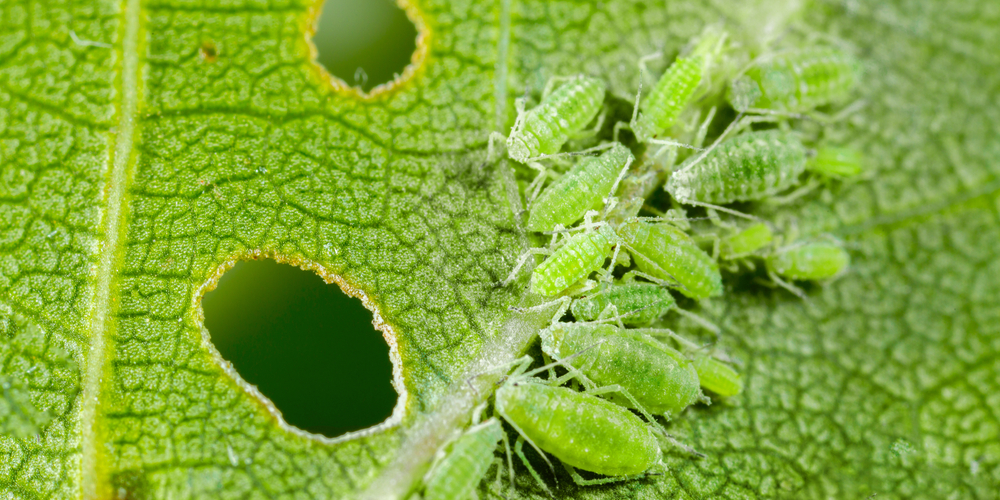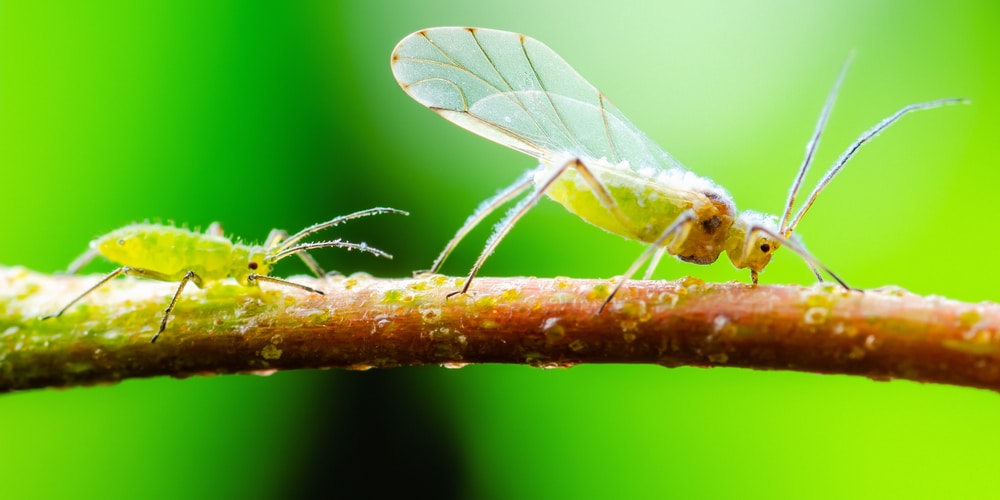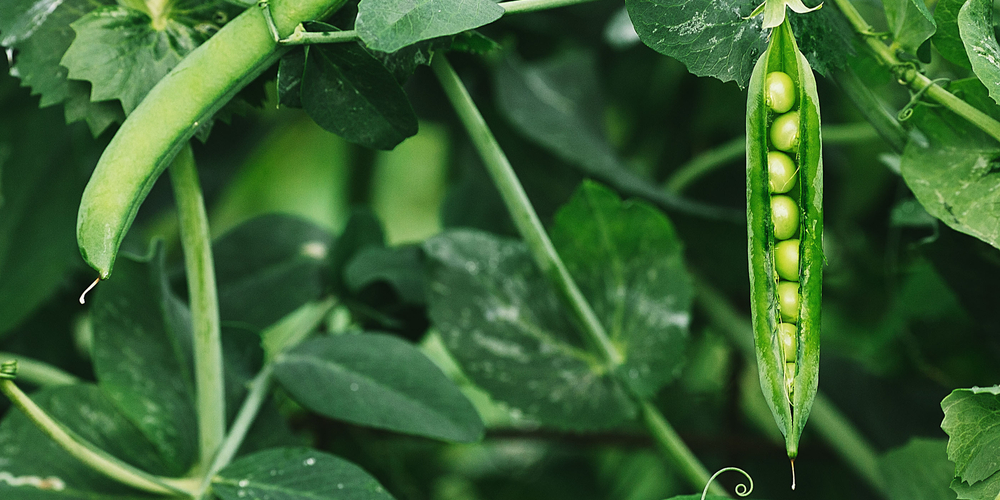Peas are one of the earliest vegetables to be cultivated, and they have long been a favorite of gardeners and chefs alike. Peas are relatively easy to grow, and they are a good source of vitamins and minerals. However, aphids can be a problem for pea plants.
Aphids are small, sap-sucking insects that can damage leaves and stunt plant growth. Gardeners often find aphids on peas because the insects are attracted to the plants’ sweet sap. Unfortunately, this sugary substance can also attract other pests, like ants and bees.
What are Aphids and What Do They Do to Plants?

Aphids are small, soft-bodied insects that can be found in various colors, including green, brown, and black. They are often found in gardens, where they feed on the sap of plants.
While they are usually harmless to humans, they can cause significant damage to crops and other plants. Aphids insert their mouthparts into plant tissue and suck out the sap. This can cause leaves to curl, distort, and eventually die.
In addition, these pests excrete a sticky substance known as honeydew, which can encourage the growth of sooty mold. This black fungus can block out sunlight and interfere with the plant’s photosynthesis process.
While a few aphids may not cause much damage, a large infestation can weaken and even kill a plant. Aphid saliva contains toxins that can disrupt plant growth, and their constant feeding can stunt the development of new leaves and flowers.
Why Do Aphids Infest Your Peas?
If you’ve ever had a pea plant in your garden, chances are you’ve also had aphids. These small, soft-bodied insects are attracted to pea plants for several reasons.
First of all, pea plants are rich in nectar, which aphids feed on. In addition, pea plants often have high levels of calcium, which aphids need for their shells. The calcium in pea plants also helps aphids to reproduce.
Aphids are often spread by wind, birds, and other animals. They can also be transported on the clothes or shoes of gardeners and other people who come into contact with infected plants.
Additionally, the dense foliage of pea plants provides shelter from predators and the elements. As a result, aphids often infest pea plants in large numbers, causing damage to the leaves and stems. A single aphid can produce up to 80 offspring in a single week, so infestations can quickly get out of control.
What Can You Do to Control Aphids on Your Peas?
While there’s no denying that aphids on peas can be a nuisance, there are a few things you can do to control them.
Plant Peas in Well-Draining Soil
Well-drained garden beds are less likely to become waterlogged and allow for better root growth, making for healthier plants that are less susceptible to pests and disease. If your garden is particularly wet or has drainage issues, consider raising the bed or adding a layer of gravel to improve drainage.
Additionally, avoid planting peas in the same spot year after year. Aphids and other pests can build up in the soil, so it’s best to rotate your crops on a yearly basis.
Take Them Out by Hand
If you have a small garden, you can remove aphids from your plants by hand. Simply pick them off the leaves and stems and drop them into a bucket of soapy water.
This method is most effective when done on a regular basis, as it will prevent the aphids from causing too much damage. However, it’s important to be careful not to damage the plant leaves while removing the aphids.
Attract Aphid’s Natural Predators
There are a number of predators that feed on aphids, including ladybugs, lacewings, and parasitic wasps.
You can attract these predators to your garden by planting flowers that attract them, such as dandelions, yarrow, and fennel. You can also purchase ladybugs from a garden center and release them into your garden.
Apply Insecticidal Soap or Neem Oil
If you already have aphids on your peas, you can control them with insecticidal soap or neem oil.
Insecticidal soap is a safe and effective way to kill aphids and other soft-bodied insects. It works by breaking down the insect’s exoskeleton, causing it to dehydrate and die.
To make your own insecticidal soap, mix one tablespoon of dish soap with one quart of water. Spray the mixture on infested plants, being sure to cover the undersides of the leaves where aphids tend to hide.
Neem oil is another effective option for controlling aphids on peas. It works by disrupting the insect’s hormone system, causing it to stop eating and eventually die.
To use neem oil, mix two teaspoons of neem oil with one quart of water. Spray the mixture on infested plants, covering the undersides of the leaves where aphids tend to hide.
Sow Peas Early in the Season
Sowing your peas early in the season will give them a head start on growth, meaning they’re more likely to be able to outgrow any damage caused by aphids. Sow seeds in late winter or early spring, around the same time you would sow sweet peas.
Keep Your Peas Watered
Aphids are attracted to stressed plants, so it’s important to keep your peas well watered during dry periods. A consistent water supply will also help plants grow strong and healthy, making them less appealing to aphids.
During periods of drought, consider adding a layer of mulch to the soil around your plants. This will help to retain moisture and keep the roots cool.
Harvest Peas Regularly
Aphids are most likely to infest peas that are left on the plant to mature. To discourage aphids, harvest your peas regularly, as soon as they reach maturity. This will also ensure that you get the best possible flavor from your peas.
Aphid Prevention on Pea Plants
The best way to control aphids is to prevent them from infesting your plants in the first place.
Here are a few tips for preventing aphids on your peas:
- Plant early-maturing varieties of peas.
- Grow peas in a well-ventilated area.
- Sow seeds in well-drained soil.
- Keep the garden tidy and free of debris.
- Avoid planting in the same spot year after year
- Remove infested plants from the garden.
While there’s no surefire way to prevent aphids on peas, following these tips will help to reduce the risk of infestation.
Aphids on peas: Final Thoughts
The infestation of aphids on peas is a continual problem for many gardeners. While these tiny creatures may seem harmless, they can quickly decimate a pea crop.
Aphids feed on the sap of plants, and their feeding can stunt plant growth, cause leaves to yellow and wilt, and even kill young plants.
There are several ways to control aphids on peas. One method is to remove them by hand. This can be done by gently shaking the plants or by using a high-pressure sprayer to blast them off.
Another approach is to use natural predators, such as ladybugs and lacewings.
Finally, there are a number of insecticidal sprays that can be effective in controlling aphids. By taking steps to control aphids, gardeners can help protect their pea crops from this damaging pest.
Related Article: How to Get Rid of Clover Mites?


